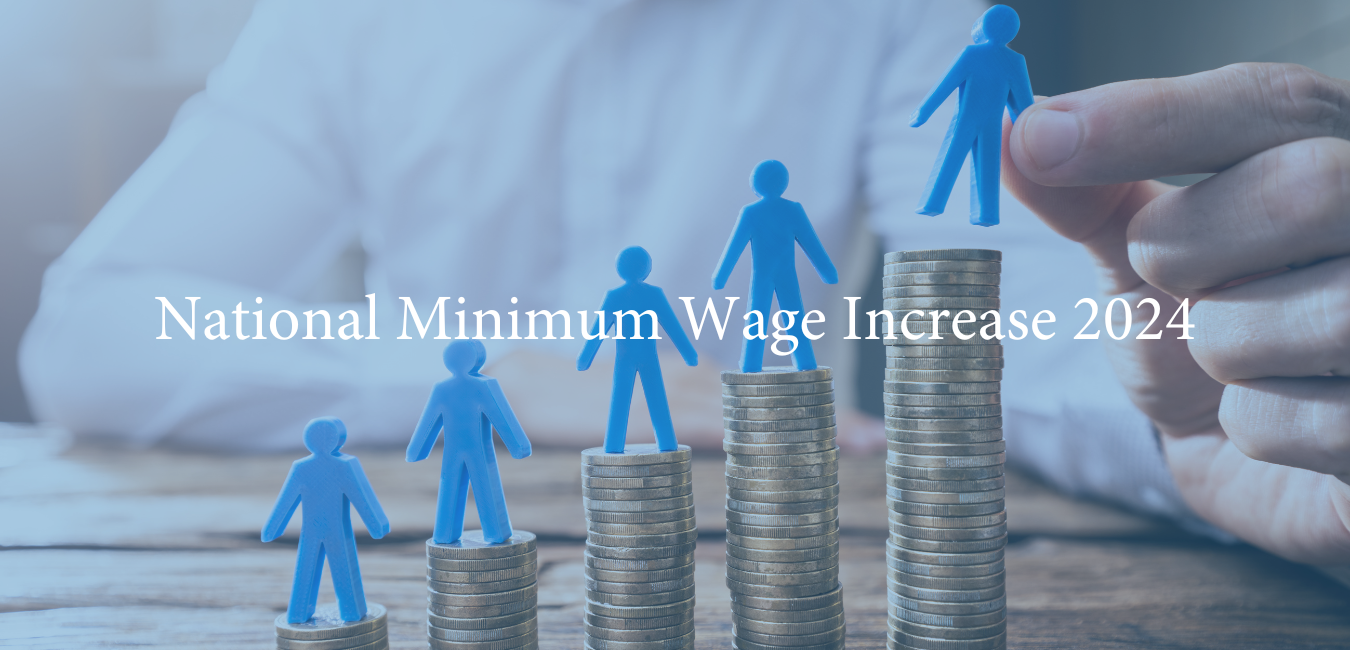National Minimum Wage Increase 2024
National Minimum Wage Increase 2024
The Government has announced National Minimum Wage, and National Living Wage rates, which will increase from 1 April 2024.
It’s crucial to understand how these wage adjustments will affect your workforce and employment practices.
By law, you will need to ensure that all staff members are paid the increased minimum wage for their age group by 1 April 2024.
April 2024 Rates
The hourly rate for the minimum wage depends on age and whether you’re an apprentice.
The rates which will apply from 1 April 2024 are as follows:
- National Living Wage (21 and over) £11.44 (9.8% increase)
- 18-20 Year Old Rate £8.60 (14.8% increase)
- 16-17 Year Old Rate £6.40 (21.2% increase)
- Apprentice Rate £6.40 (21.2% increase)
National Living Wage
From 1 April 2024, the UK National Living Wage will extend to workers aged 21 and over, not just those over 23.
The National Living Wage (NLW) provides a higher wage threshold for workers aged 21 and over, reflecting their experience and living cost considerations.
What you need to do as an employer
It’s crucial to understand how these wage adjustments will affect your workforce and employment practices. All employers, regardless of size, need to pay the correct rates; and if you employee agency workers or part time workers, they are still entitled to the Living Wage or NMW.
By law, you will need to ensure that all staff members are paid the increased minimum wage for their age group by 1 April 2024.
If you are already paying your employee’s above the new minimum amount, you aren’t required to take any action.
How to remain compliant
Know the new rates
Ensure you are aware of the updated minimum wage rates. Failure to comply can lead to legal penalties.
Review your payroll processes
Review your current pay rates to ensure you pay all employees at least the National Minimum Wage. Accurate records of all employees, birthdays, wages, and hours worked are critical to your business’s compliance, and will help you quickly identify any employees currently paid below the new NMW rate.
*And don’t forget to check your employees’ wages against schemes such as salary sacrifices, which could see cash wages dip below the new limits.
Review Contracts and Policies
Update your employment contracts, policies, and payroll systems to reflect the new wage rates.
Adjust both hourly and salaried employees
If you employ a mix of pay structures, you’ll need to review and adjust accordingly. The 2024 minimum wage requirements apply to both hourly workers and salaried employees.
Budget Adjustments
Review your payroll budget to accommodate the increased wages. This might involve reassessing your current expenses and finding areas where costs can be optimised.
Communicate with your employees
The best approach is to be proactive with your communication by letting employees know about the wage changes that will impact their pay.
What you need to know as an employee
If you’re an employee, you can check to see if you’re being paid the right amount here.
Be aware of the new minimum wage that you are legally entitled to. If you're unsure, consult the official government website or your HR department for clarification.
If you find that your employer is not complying with the new wage regulations, talk to your HR department, a trade union representative, or seek advice from employment rights organisations.
Employers who don’t pay their staff the right rates not only face potential claims from workers but also risk being publicly called out in a government report. It’s crucial for you to stay updated on pay rate increases, especially the application of the National Living Wage (NLW) to workers aged 21 and starting 1st April 2024.
The information and opinions contained in this article are not intended to be comprehensive, nor to provide legal advice. No responsibility for its accuracy or correctness is assumed by GGM Accountancy Ltd.
Menu
Get In Touch
Tel: 01733 247500
Email: admin@ggmaccountancy.co.uk
Office: Unit 12, Broadway Shopping Centre
Malting Square, Yaxley, Peterborough
PE7 3JJ
Sign Up To Our Newsletter
Contact Us
We will get back to you as soon as possible
Please try again later
Proud Partners Of
Menu
Get In Touch
Tel: 01733 247500
Email: admin@ggmaccountancy.co.uk
Office: 42 Tyndall Court, Commerce Road
Lynch Wood, Peterborough, PE2 6LR
Follow Us On Social Media
Sign Up To Our Newsletter
Contact Us
We will get back to you as soon as possible
Please try again later
All Rights Reserved | GGM Accountancy Ltd | Website designed by Onelink Media









